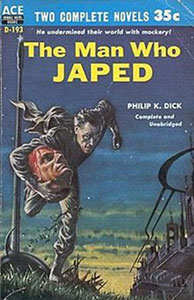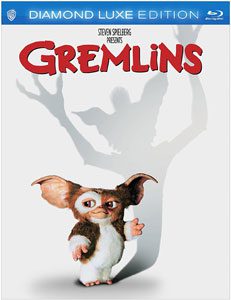Philip K. Dick is known for wild ideas, so sometimes I anticipate them from the title. Before reading “The Man Who Japed” (1956), I would’ve guessed “to jape” means to jump through time or dimensions, and while the book does touch on that concept, it actually means “to pull a practical joke.” It should be noted PKD didn’t invent “jape” – Merriam-Webster says it originated in the 14th century and had a resurgence in the 19th century – but I think it’s fair to say he resurrects a forgotten word.
It’s funny they know what a joke is
It’s almost surprising that this Newer York society of 2114 even has a word for a practical joke, because it is a rigidly moral society by design. After nuclear war in the 1970s, a Moral Reclamation government takes over. For short, it’s “Morec” – one of those PKD words that grows out of two old ones.
“The Man Who Japed” is in the same subgenre as George Orwell’s “1984” – written less than a decade prior – in that it’s about a government that aims to control thought. But “Japed” shows both a lighter and a more plausible future. “1984” highlights brute government force, wherein government employees rewrite “facts.”

In “Japed,” Dick understands that governments need the support of most of the populace in order to be stable. Illustrating this stability, we see a much lower level of government – Allen Purcell’s conapt – enforcing Morec rules through democratic voting. Morec is a given in this future; there’s no prominent competing ideology. It’s darn near self-enforced.
PKD doesn’t explain the precise transition from 1956’s (comparatively) free society to 2114’s Morec society, but it’s fun to fill in the gap on our own. I think “Japed” shows principles of the drug war extrapolated to an entire governmental structure.
Many people agree that an immoral thing done by individuals (drug use) needs to be eradicated, and that serves as a springboard for those same people to accept another immoral thing (imprisonment of drug users) done by the government. Take that to the extreme and you get Morec.
Purcell isn’t powerless
Purcell isn’t a powerless Joe Schmo, however; he is a key player in Telemedia, the government propaganda arm. Purcell and his colleagues create “packets,” which are mixtures of advertising and entertainment. They tell people what to think.
Still, there are some rebels. Mostly, these free thinkers are shipped off to “Other World” by “Health Resort” (the psychiatric care branch of the government), but we also see hints of individual thought among government officials.
A sleepwalking Purcell japes the statue of Streiter, the founder of Morec; he cuts off the head a la the opening credits of “The Simpsons” but goes a step further: He repositions the statue so it is punting its head like a football. Police officers assigned to guard the vandalized statue giggle.
Purcell (and those police officers, to a lesser degree) is like the protagonists of Dick’s “The Man in the High Castle” or Giles in the alternate-reality “Buffy” episode “The Wish.” For no solid reason, they sense that the world they live in is not the right one.
Arguably, the right world is … Other World. Upon his arrival, Purcell encounters a girl sunbathing nude in her yard who kindly gives him directions to his house – and his new wife. In short, it’s a planet where anarchists can live in peace.
Other World is the better world
When reading this segment of the book, it didn’t ring true to me that Purcell doesn’t embrace Other World. I wondered if it might’ve played better if Other World was fake; like if the residents were in fact in “Matrix”-like pods but they are starting to notice the fakery. Since it is a real place, I thought “Why do you want to leave?”
Upon reflection, this is because I’m geared to expect a PKD protagonist to be a Sad Sack who lets things happen to him, for better or worse. But Purcell has true empathy and decency (unlike the false feelings held by the populace at large).
He cares about his Earth-based wife, and he also cares about the next generation faced with living in a Morec society. Purcell is not a minor bureaucrat like many PKD leads. Rather, as the recently appointed head of Telemedia, he has the power to alter society.
That said, Purcell is a classic PKD character in the sense that he experiences future versions of absurd everyday annoyances, and this allows for vintage PKD humor. He stumbles home to his conapt drunk, so that means he’s called before the board. His fellow residents either denounce or forgive his moral lapse, but in order to preserve their anonymity, their voices are disguised to sound the same. Therefore, it all sounds like one stream of self-contradictory speech to Purcell.
“The Man Who Japed” is sometimes clunky. For example, it’s distracting that people occasionally talk like Yoda, by putting the verb at the end of their statement. But overall, the novel is funny and prophetic, serving as a warning (and, unavoidably, a template) for how those in power can efficiently and effectively control not only people’s opinions, but their very mode of thought.


